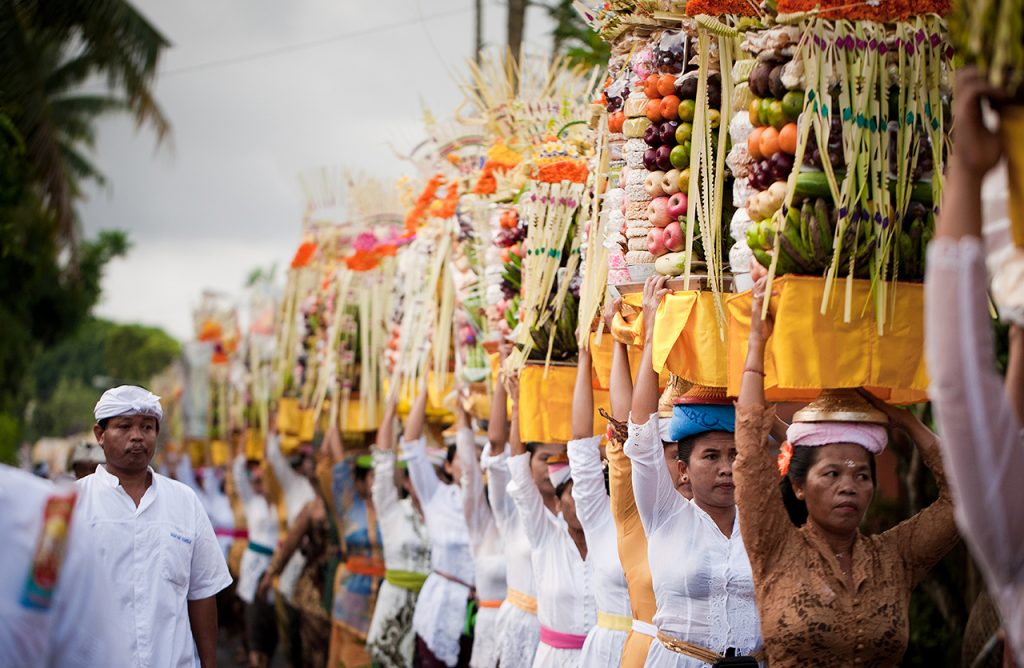

Indonesia Do’s and Don’ts
Indonesia is a complex and welcoming place. In an archipelago of more than 17,000 islands, you’ll find that everyone has their own unique style, their own traditions and a dash of flavour to add to the melting pot of this vibrant and diverse nation. As a newcomer, it can be hard to know where to begin.
A good starting point is some of the cultural norms that most people in Indonesia have in common. This will help you settle in, avoid making any faux pas, and help you to move with the ebb and flow of this fascinating archipelago.
Here’s our top do’s and don’ts for Indonesia – a handy guide to help you get the most of your travels.

Do:
1. Dress appropriately
You should always dress respectfully when visiting temples, mosques or royal palaces. This means covering your knees and shoulders and wearing clothes that are not too tight. Some temples will provide you with a sarong and sash to wear – do use them, as this is a sign of respect, and applies to both men and women. Although Bali has gotten used to seeing sunburned flesh walking around on the street, elsewhere in Indonesia you should be aware that even moderate nudity is not the norm. Probably best to give the Balinese a break too.
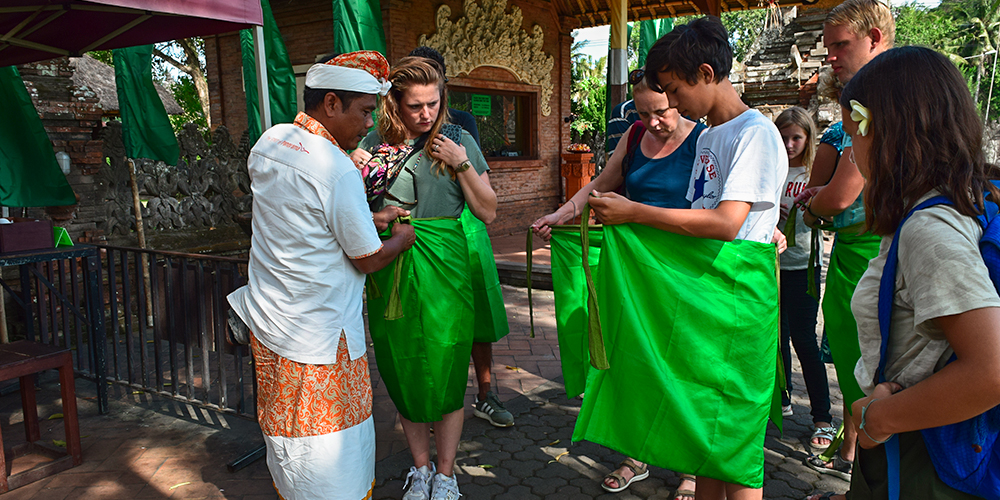
Do:
1. Dress appropriately
You should always dress respectfully when visiting temples, mosques or royal palaces. This means covering your knees and shoulders and wearing clothes that are not too tight. Some temples will provide you with a sarong and sash to wear – do use them, as this is a sign of respect, and applies to both men and women. Although Bali has gotten used to seeing sunburned flesh walking around on the street, elsewhere in Indonesia you should be aware that even moderate nudity is not the norm. Probably best to give the Balinese a break too.

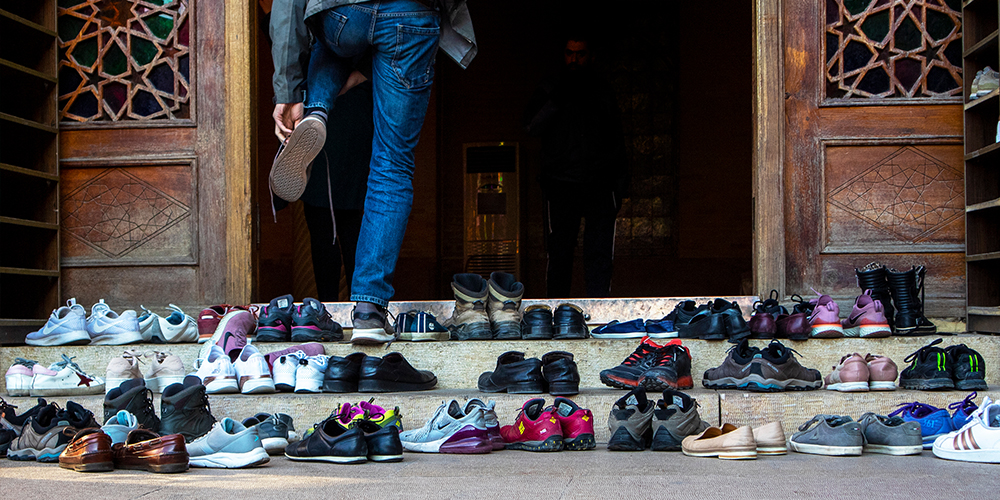
2. Take off your shoes
Often the first eyebrow-raiser for Western visitors, taking off your shoes when visiting someone's home or entering a holy place is a must. Some shops or restaurants also apply this rule, so keep an eye open for it. If you're unsure whether or not you should take your shoes off, the pile of footwear outside the door is a dead giveaway. To avoid the tedium of constant costume changes, consider ditching the shoes altogether for a week or two, and embrace the humble flip-flop.
2. Take off your shoes
Often the first eyebrow-raiser for Western visitors, taking off your shoes when visiting someone's home or entering a holy place is a must. Some shops or restaurants also apply this rule, so keep an eye open for it. If you're unsure whether or not you should take your shoes off, the pile of footwear outside the door is a dead giveaway. To avoid the tedium of constant costume changes, consider ditching the shoes altogether for a week or two, and embrace the humble flip-flop.

3. Learn some local phrases
This is true wherever you travel, but in Indonesia there really is nothing better than getting a few local words into your arsenal. Simple stuff that you can use every day - like “thank you” (terima kasih) and “delicious” (enak) – will go a long way over here. The lingua franca, known as Bahasa Indonesia is spoken just about everywhere, meaning you can show your gratitude for tasty food all the way from Sumatra to Papua.
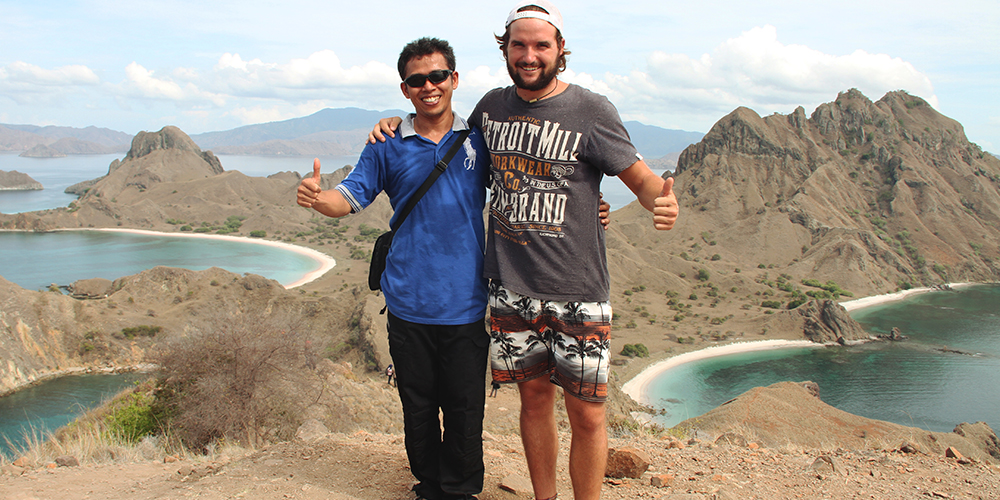
3. Learn some local phrases
This is true wherever you travel, but in Indonesia there really is nothing better than getting a few local words into your arsenal. Simple stuff that you can use every day - like “thank you” (terima kasih) and “delicious” (enak) – will go a long way over here. The lingua franca, known as Bahasa Indonesia is spoken just about everywhere, meaning you can show your gratitude for tasty food all the way from Sumatra to Papua.

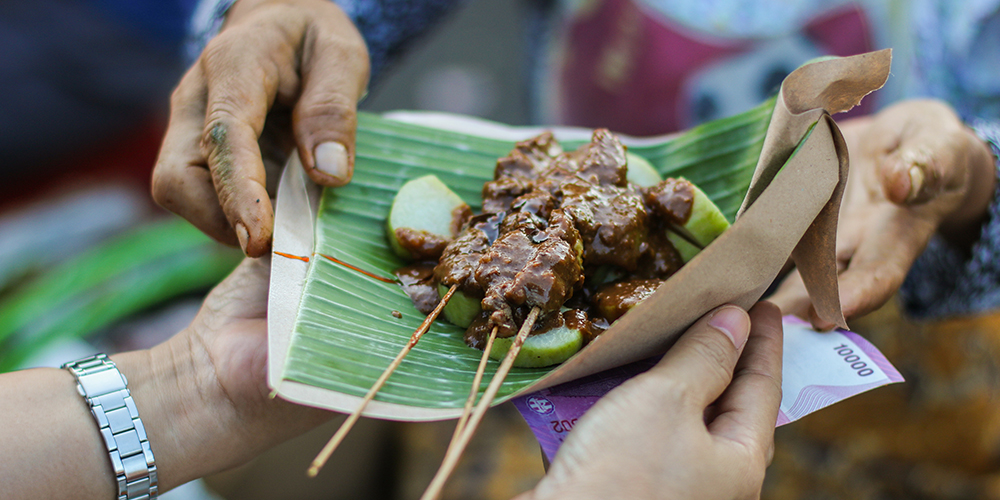
4. Try the food
Food is at the heart of Indonesian culture. All over the archipelago, eating together is a pastime that borders on an obsession, and with signature cuisine offered up by every region, in every conceivable style of dish, you’ll find that communal gustation is an endless cause for celebration! For some tips on a few must-try dishes, check out our Top 10 Indonesian Street Foods.
4. Try the food
Food is at the heart of Indonesian culture. All over the archipelago, eating together is a pastime that borders on an obsession, and with signature cuisine offered up by every region, in every conceivable style of dish, you’ll find that communal gustation is an endless cause for celebration! For some tips on a few must-try dishes, check out our Top 10 Indonesian Street Foods.

5. Smile!
Depending on where you go, you’re likely to attract quite a lot of attention. From school kids to grandmothers, Indonesians love to welcome outsiders, so expect lots of requests for selfies and invitations for tea / dinner / marriage etc. It can all be a little overwhelming at first, and you might not know how to respond without hurting feelings or appearing ungrateful. It's ok to say no – just remember to do it with a smile.

5. Smile!
Depending on where you go, you’re likely to attract quite a lot of attention. From school kids to grandmothers, Indonesians love to welcome outsiders, so expect lots of requests for selfies and invitations for tea / dinner / marriage etc. It can all be a little overwhelming at first, and you might not know how to respond without hurting feelings or appearing ungrateful. It's ok to say no – just remember to do it with a smile.

Don't:
1. Use your left hand
For mostly practical hygiene reasons that don’t need explaining here, the left hand is considered dirty in Indonesia. If you look closely, you’ll notice that everyone eats, greets and handles money with their right. For the un-initiated, it can require a concerted mental effort not to offer the wrong hand for things like change and receipts. If you’re a lefty, a visit to Indonesia is a good opportunity to work on your ambidexterity!

Don't:
1. Use your left hand
For mostly practical hygiene reasons that don’t need explaining here, the left hand is considered dirty in Indonesia. If you look closely, you’ll notice that everyone eats, greets and handles money with their right. For the un-initiated, it can require a concerted mental effort not to offer the wrong hand for things like change and receipts. If you’re a lefty, a visit to Indonesia is a good opportunity to work on your ambidexterity!


2. Shout or act aggressively
Indonesians – and particularly the Javanese - are respectful, well-mannered people, with a complex set of rules dictating public behaviour. Adversity and animosity are generally absorbed with a gentle smile and a stoic self-restraint that can border on the miraculous. A sure fire way of standing out in the crowd for all the wrong reasons is to lose your temper. In the heat and confusion of the tropics, this can be easier send than done.
2. Shout or act aggressively
Indonesians – and particularly the Javanese - are respectful, well-mannered people, with a complex set of rules dictating public behaviour. Adversity and animosity are generally absorbed with a gentle smile and a stoic self-restraint that can border on the miraculous. A sure fire way of standing out in the crowd for all the wrong reasons is to lose your temper. In the heat and confusion of the tropics, this can be easier send than done.

3. Step over someone
In Indonesia, status and respect can be deciphered or implied through body language – particularly the level of one’s body (and voice). You’ll notice younger people bowing gently to their elders or lowering their gaze as they pass – this is a sign of respect. Take care when passing someone older than you, and definitely avoid stepping over someone. Pointing with the finger or gesturing with the feet is considered very rude, so look out for creative mannerisms using eyebrows, nose and even lips!
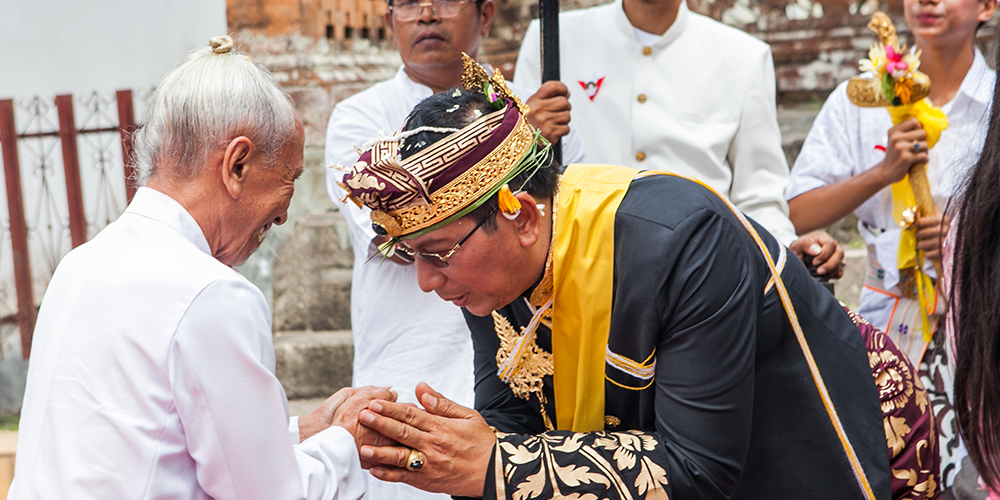
3. Step over someone
In Indonesia, status and respect can be deciphered or implied through body language – particularly the level of one’s body (and voice). You’ll notice younger people bowing gently to their elders or lowering their gaze as they pass – this is a sign of respect. Take care when passing someone older than you, and definitely avoid stepping over someone. Pointing with the finger or gesturing with the feet is considered very rude, so look out for creative mannerisms using eyebrows, nose and even lips!

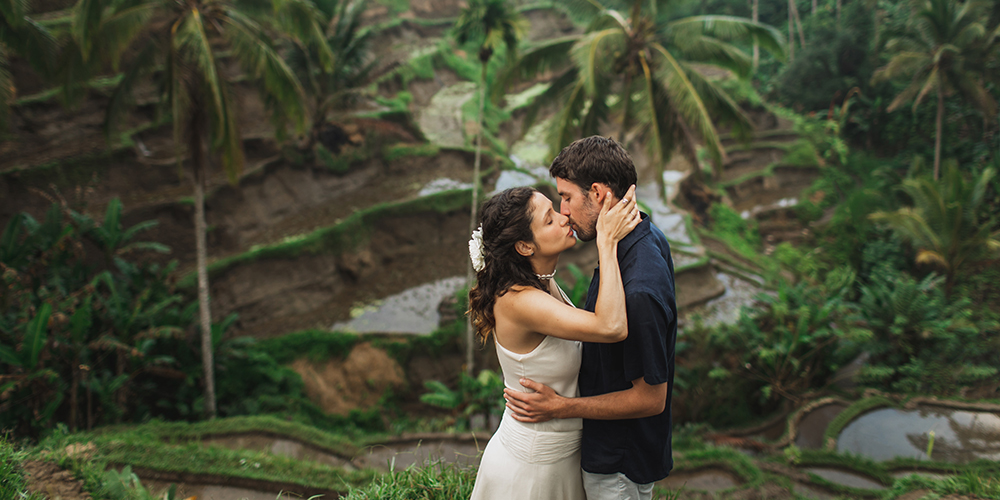
4. Be overtly sexual
Although certain areas of Indonesia – like Bali – are known for their liberal attitudes, you will find that, for the most part, traditional, conservative values continue to hold sway. This is especially true for PDA – Public Displays of Affection. Even if you’ve been married for 50 years, kissing and canoodling in public will be frowned upon. If you’re un-married – and particularly if you’re LGBT – it’s generally best to keep a low profile. Attitudes are changing in Indonesia, but as a visitor, it’s wise not to impose one’s own standards and practices on a culture that’s not accustomed.
4. Be overtly sexual
Although certain areas of Indonesia – like Bali – are known for their liberal attitudes, you will find that, for the most part, traditional, conservative values continue to hold sway. This is especially true for PDA – Public Displays of Affection. Even if you’ve been married for 50 years, kissing and canoodling in public will be frowned upon. If you’re un-married – and particularly if you’re LGBT – it’s generally best to keep a low profile. Attitudes are changing in Indonesia, but as a visitor, it’s wise not to impose one’s own standards and practices on a culture that’s not accustomed.

5. Drink the water
Ok, so this isn’t strictly a cultural thing, but for anyone that’s ever absent-mindedly sampled the tap water and then spent the next two weeks attached to the toilet, it’s still good advice. Water from the faucet is NOT safe for drinking, pretty much everywhere in Indonesia, so get into the habit of using bottled water. Or, better yet, tap into the growing network of refill stations, which allow you to fill your tumbler, avoid single-use plastics and help keep Indonesia green!

5. Drink the water
Ok, so this isn’t strictly a cultural thing, but for anyone that’s ever absent-mindedly sampled the tap water and then spent the next two weeks attached to the toilet, it’s still good advice. Water from the faucet is NOT safe for drinking, pretty much everywhere in Indonesia, so get into the habit of using bottled water. Or, better yet, tap into the growing network of refill stations, which allow you to fill your tumbler, avoid single-use plastics and help keep Indonesia green!

Have you found this article useful? If so, check out a few more of our Travel Tips for Indonesia.
Have you found this article useful? If so, check out a few more of our Travel Tips for Indonesia.
Top 5 Indonesian Destinations To Visit In 2023
3rd July 2022
With borders open and tourism back in business, international travellers can finally start planning their trip to Indonesia. There’s always somewhere new to explore in this enormous archipelago. In our latest Travel Tips, we take a look at five of […]
READ MORETop 5: Adventures In East Java
25th October 2020
Looking for a little travel inspiration to keep you warm this winter? With a fiery mix of spice, volcanoes, artistry, tobacco and sunshine, East Java is the perfect place to get away from it all and turn up the heat […]
READ MOREIndonesia Do’s And Don’ts
21st January 2020
Indonesia is a complex and welcoming place. In an archipelago of more than 17,000 islands, you’ll find that everyone has their own unique style, their own traditions and a dash of flavour to add to the melting pot of this […]
READ MORETop 10: Bars & Clubs In Jakarta
3rd January 2018
Jakarta, the frenetic capital of Indonesia, is the bustling backdrop for some of the best nightlife Southeast Asia has to offer. From rooftop cocktail bars overlooking cityscapes, to elite socialite lounges and subterranean clubs spinning the best underground beats. The […]
READ MORETop 10: Bars & Clubs In Bali
2nd January 2018
Most of the best nightclubs in Bali are located within the Kuta and Seminyak area, whilst a great selection of beachfront and rooftop bars has sprung up all over the island’s major tourism hotspots. Kuta’s reasonable prices and laid-back party […]
READ MORE5 Reasons To Book Bali Now
15th December 2017
Now that the recent eruptions from Mount Agung have subsided, Bali is back to its beautiful best. If you’re thinking about Bali for your next holiday, but unsure whether the time is right, take a look below; you’ll see that […]
READ MORETop 10: Things To See In Bali
16th November 2017
Bali is quite rightly regarded as one of the best destinations in the world for travellers. With its intoxicating blend of beautiful landscapes, tropical climate, unique cultural traditions and natural wonders, the island has much to offer. In this list, […]
READ MORE7 Places Off The Beaten Track In East Lombok
4th May 2017
The east of Lombok is an area filled with many hidden treasures. For intrepid travellers with wanderlust and a taste for solitude, many adventures await at the end of the road. In this article, we feature seven of the best-kept […]
READ MORE7 Reasons To Visit Raja Ampat
21st March 2017
Beauty above and below the waves Thanks to Raja Ampat’s remote location and its many coral labyrinths, this is an ecosystem and a landscape that has remained largely untouched by man; a serene and beautiful Eden, where nature flourishes in […]
READ MORETop 10: Natural Wonders Of Indonesia
16th March 2017
Indonesia is a cluster of volcanic and tropical islands speckled along the ring of fire, which splits the Indian and Pacific oceans and straddles the equator. More than 17,000 islands make up a star-studded landscape home to volcanoes, jungles, lakes, […]
READ MORETop 10: Indonesian Island Getaways
13th March 2017
There are more than 17,000 islands to be discovered in Indonesia. Each one offers travellers a unique and unforgettable experience, with volcanoes, rainforests, coral gardens, ancient villages and lazy days spent in the sun. In this article, we take a […]
READ MORETop 10: Indonesian Street Foods
9th March 2017
They say the heart of a home is its kitchen; that the soul of a city is on its streets. In Indonesia, the street is the kitchen, where cooks keep a fire burning all day long and the food is […]
READ MORETop 10: Incredible Animal Encounters In Indonesia
2nd March 2017
The name comes from the Malay language, meaning ‘man of the forest’, and this gentle ginger ape is one of our closest cousins; Orangutan share 96.4% of our genes. Dedicated and loving parents, these great apes are highly intelligent creatures, […]
READ MORETop 10: Diving Destinations In Indonesia
22nd February 2017
17,000 islands, 80,000 kilometers of coastline, 3.1 million square kilometers of territorial waters, 3,000 fish species, and 600 coral species—it all adds up to the ultimate scuba experience. In Indonesia you’ll find excellent shallow reef diving, as well as deep […]
READ MORETop 10: Festivals And Celebrations Of Indonesia
20th February 2017
In Indonesia, the calendar is filled with festivals and celebrations, both traditional and contemporary. Thanks to its bewildering array of languages, ethnicities, traditions and beliefs, Indonesia offers visitors an infinite set of showpieces, some of which date back to prehistory. […]
READ MORE10 Things To Pack When Traveling To Indonesia
19th February 2017
So, your ticket’s booked and Indonesia is finally going to happen. Pretty soon you’ll be living all those picture postcard moments in paradise. With so many adventures ahead, it’s hard to know how best to prepare. Not to worry – […]
READ MORETop 5 Indonesian Destinations To Visit In 2023
With borders open and tourism back in business, international travellers can finally start planning their trip to Indonesia. There’s always somewhere new to explore in this enormous archipelago. In our latest Travel Tips, we take a look at five of […]
Top 5: Adventures In East Java
Looking for a little travel inspiration to keep you warm this winter? With a fiery mix of spice, volcanoes, artistry, tobacco and sunshine, East Java is the perfect place to get away from it all and turn up the heat […]
Indonesia Do’s And Don’ts
Indonesia is a complex and welcoming place. In an archipelago of more than 17,000 islands, you’ll find that everyone has their own unique style, their own traditions and a dash of flavour to add to the melting pot of this […]
Top 10: Bars & Clubs In Jakarta
Jakarta, the frenetic capital of Indonesia, is the bustling backdrop for some of the best nightlife Southeast Asia has to offer. From rooftop cocktail bars overlooking cityscapes, to elite socialite lounges and subterranean clubs spinning the best underground beats. The […]
Top 10: Bars & Clubs In Bali
Most of the best nightclubs in Bali are located within the Kuta and Seminyak area, whilst a great selection of beachfront and rooftop bars has sprung up all over the island’s major tourism hotspots. Kuta’s reasonable prices and laid-back party […]
5 Reasons To Book Bali Now
Now that the recent eruptions from Mount Agung have subsided, Bali is back to its beautiful best. If you’re thinking about Bali for your next holiday, but unsure whether the time is right, take a look below; you’ll see that […]
Top 10: Things To See In Bali
Bali is quite rightly regarded as one of the best destinations in the world for travellers. With its intoxicating blend of beautiful landscapes, tropical climate, unique cultural traditions and natural wonders, the island has much to offer. In this list, […]
7 Places Off The Beaten Track In East Lombok
The east of Lombok is an area filled with many hidden treasures. For intrepid travellers with wanderlust and a taste for solitude, many adventures await at the end of the road. In this article, we feature seven of the best-kept […]
7 Reasons To Visit Raja Ampat
Beauty above and below the waves Thanks to Raja Ampat’s remote location and its many coral labyrinths, this is an ecosystem and a landscape that has remained largely untouched by man; a serene and beautiful Eden, where nature flourishes in […]
Top 10: Natural Wonders Of Indonesia
Indonesia is a cluster of volcanic and tropical islands speckled along the ring of fire, which splits the Indian and Pacific oceans and straddles the equator. More than 17,000 islands make up a star-studded landscape home to volcanoes, jungles, lakes, […]
Top 10: Indonesian Island Getaways
There are more than 17,000 islands to be discovered in Indonesia. Each one offers travellers a unique and unforgettable experience, with volcanoes, rainforests, coral gardens, ancient villages and lazy days spent in the sun. In this article, we take a […]
Top 10: Indonesian Street Foods
They say the heart of a home is its kitchen; that the soul of a city is on its streets. In Indonesia, the street is the kitchen, where cooks keep a fire burning all day long and the food is […]
Top 10: Incredible Animal Encounters In Indonesia
The name comes from the Malay language, meaning ‘man of the forest’, and this gentle ginger ape is one of our closest cousins; Orangutan share 96.4% of our genes. Dedicated and loving parents, these great apes are highly intelligent creatures, […]
Top 10: Diving Destinations In Indonesia
17,000 islands, 80,000 kilometers of coastline, 3.1 million square kilometers of territorial waters, 3,000 fish species, and 600 coral species—it all adds up to the ultimate scuba experience. In Indonesia you’ll find excellent shallow reef diving, as well as deep […]
Top 10: Festivals And Celebrations Of Indonesia
In Indonesia, the calendar is filled with festivals and celebrations, both traditional and contemporary. Thanks to its bewildering array of languages, ethnicities, traditions and beliefs, Indonesia offers visitors an infinite set of showpieces, some of which date back to prehistory. […]
10 Things To Pack When Traveling To Indonesia
So, your ticket’s booked and Indonesia is finally going to happen. Pretty soon you’ll be living all those picture postcard moments in paradise. With so many adventures ahead, it’s hard to know how best to prepare. Not to worry – […]













